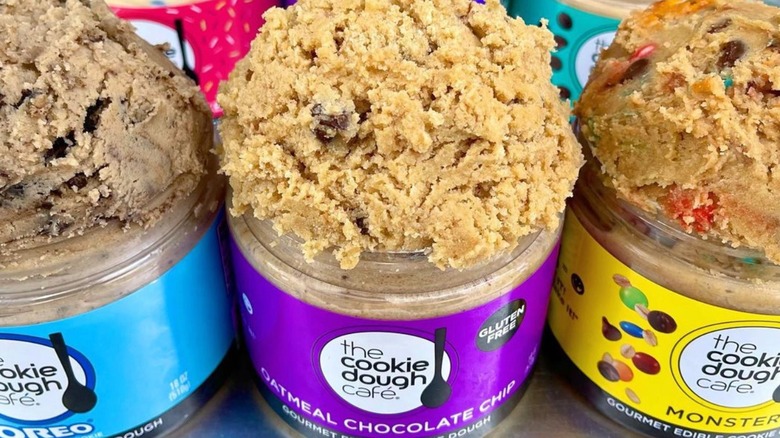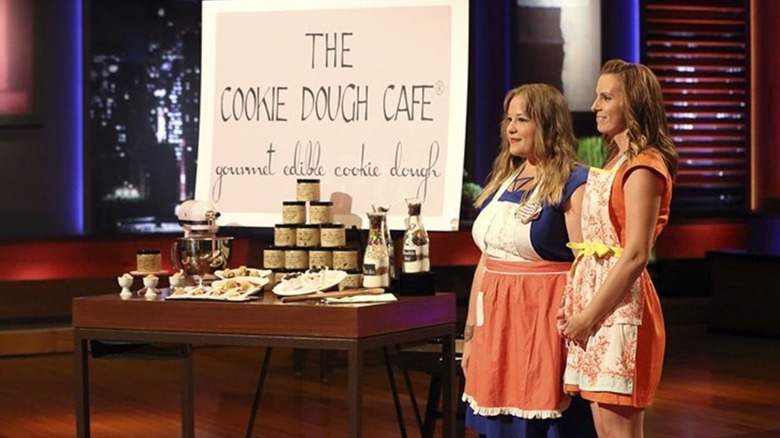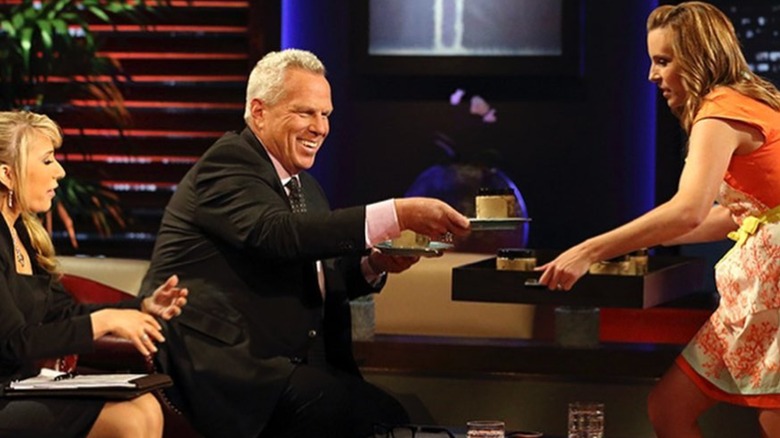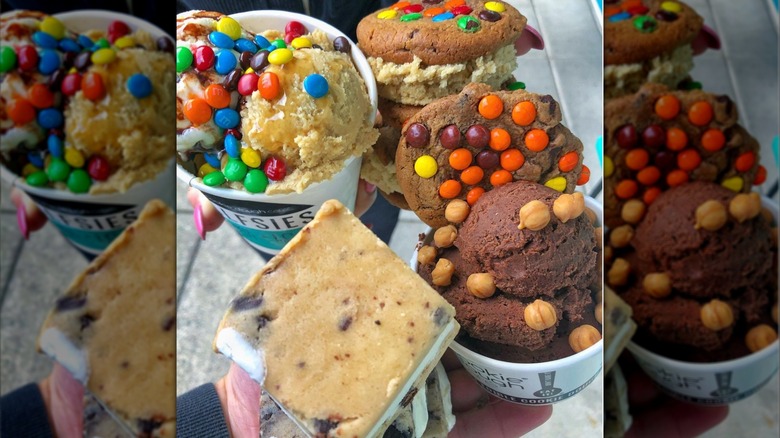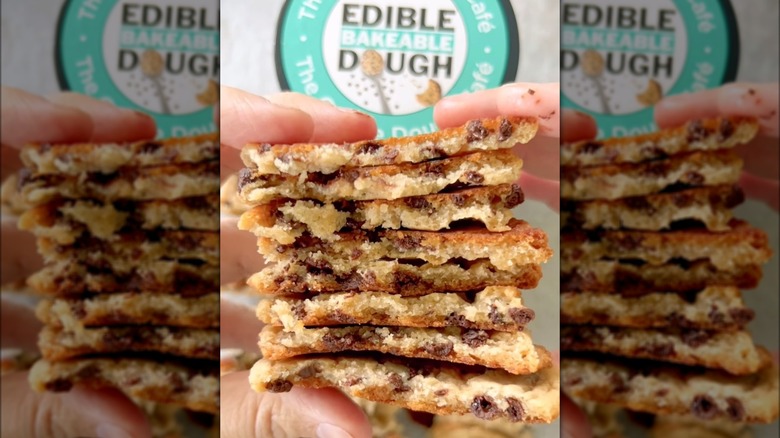The Cookie Dough Café: Here's What Happened After Shark Tank
When they appeared on Season 5 of "Shark Tank" nine years ago, sisters Joan Pacetti and Julia Schmid — the duo behind The Cookie Dough Café — had already made deals to have their product in a handful of stores, all while packaging and delivering their edible cookie dough themselves. After personally investing $35,000, this female-run business was in need of an injection of capital to ramp up distribution opportunities and take their delicious product nationwide.
Like all of us, the sisters grew up loving the taste of raw cookie dough, but they knew eating uncooked flour or raw eggs could make you sick. Unable to ignore the temptation, but also the risks of foodborne illnesses like salmonella and E. coli, Pacetti and Schmid created the market's first-ever safe-to-eat, egg-free, cooked flour raw cookie dough.
The sisters' products first appeared on supermarket refrigerator shelves in 2012 when Fresh Market in Normal, Illinois agreed to carry snack-sized portions after meeting with the founders. Within two years, The Cookie Dough Café outgrew its subleased 300-square-foot kitchen (located at a popcorn shop) and its traveling cookie dough truck and moved to a 1,500-square-foot facility with a walk-in freezer. But it still wasn't enough to get the business up to scale.
Looking for an investment to increase production, Pacetti and Schmid pitched their sweet idea to the sharks — in this episode, Kevin O'Leary, Daymond John, Mark Cuban, Lori Greiner, and guest panelist Steve Tisch. And, soon, the sisters were transitioning from selling pints to pallets.
What happened to The Cookie Dough Café on Shark Tank?
Seeking an initial investment of $50,000 for 20% equity in the company, founders Joan Pacetti and Julia Schmid wanted to purchase new equipment to automate their production and put an end to having to hand-pack each jar of cookie dough. In the 2014 episode, they shared with the sharks that they had a new purchase order from The Fresh Market, which would increase distribution to an additional 50 stores, plus, there was interest from a new player, Walgreens, at play — but not all the sharks bit at first.
Despite enjoying the samples they were given, sharks Kevin O'Leary, Daymond John, and Mark Cuban passed on the investment, citing current sales numbers and the company's early stage of development. With each pint costing $2.20 to make and selling for $6.99, O'Leary, John, and Cuban just weren't impressed with the company's volume. As it was noted, the highest-grossing retailer (Fresh Market) only had $11,000 in sales over a year's time, while the company's year-to-date total sales were $24,000. When Pacetti tried to entice Cuban with an exclusive to sell at the American Airlines Center arena (where Cuban's Dallas Mavericks play), it was shark Lori Greiner that had an idea.
Greiner proposed a 50/50 partnership with fellow shark Steve Tisch, the latter being the co-owner of another sports team, the New York Giants. Greiner pitched an exclusive for Tisch's stadium, with Tisch thinking he could also get hotel chains on board. Together, they offered $100,000 for a 40% stake, which began negotiations. It concluded with all parties settling for a $100,000 investment and 30% stake in the company.
Life for The Cookie Dough Café after Shark Tank
After agreeing to the deal, it appears sharks Lori Greiner and Steve Tisch never actually invested in The Cookie Dough Café. The sisters currently retain ownership of their company through the LLC, Juju Bakes. However, that hasn't stopped Pacetti and Schmid from acknowledging how the show's publicity helped their company grow.
Since appearing on "Shark Tank," The Cookie Dough Café has expanded its market to roughly 10,000 retailers nationwide, including Walmart, Kroger, Shop Rite, and price clubs BJ's Wholesale Club and Costco. It's also available online through the official website and Amazon.
The raw cookie dough is available in six flavors — Chocolate Chip, Oatmeal Chocolate Chip, Brownie Batter, Confetti Cake, Cookies N' Cream, and Everything But the Cookie. Consumers can purchase it in several sizes, including 'dough-to-go' gourmet edible cookie dough bars, 3.5-ounce mini containers that conveniently come with a spoon (available in 4-, 8-, and 16-pack cases), and 18-ounce jars (shipped in 3-, 6-, and 8-pack bundles).
Resellers, like ice cream shops, can purchase the product online in 12.5-pound (200-ounce) tubs that contain 114 scoops of edible cookie dough. Each tub is $89, or there's the option for a 2-pack bundle for $150; wholesale orders begin at 100 tubs. The cookie dough arrives refrigerated but can be frozen for up to a year.
Is The Cookie Dough Café still in business?
In November 2017, The Cookie Dough Café opened its first brick-and-mortar restaurant in Portland, Oregon, where customers can get scoops of cookie dough in eight flavors, as well as one-of-a-kind cookie dough products and traditional ice cream products like ice cream sandwiches, milkshakes, and hand-packed pints.
Grab-and-go options here include Halfsies (pre-packaged cookie dough and ice cream combinations), freshly-baked cookies, Bites Boxes (12 assorted cookie dough bites with different toppings), Dream Pints (layers of cake, cookie dough frosting, and pieces of cookie dough all put together), and frosted cookie dough cookies. Even better, food delivery services like Uber Eats, Grubhub, and DoorDash can deliver the refrigerated treat right to your door.
All of The Cookie Dough Café's standard products are certified kosher, and the company has vegan, gluten, and dairy-free options. Although the company has an allergy warning that its cookie doughs are "made in a facility that processes tree nuts, peanuts, wheat, eggs, soy, and milk," the Federal Department of Agriculture issued a recall of 15 cases of its 1.6-ounce Chocolate Chip Chilled Gourmet Edible Cookie Dough Bars in July 2019 for possibly containing peanuts. It has since been rectified.
What's next for The Cookie Dough Café?
When H3R Magazine asked founders Joan Pacetti and Julia Schmid where they see The Cookie Dough Café heading in 10 years, the sisters answered, "We hope in everyone's refrigerator. We want our customers to have the opportunity to swing by their local supermarkets, grab dough on the go at their local gas station/convenience store, or visit a scoop shop."
Although the company's tagline has been, "Eat it! Don't bake it!" for over a decade, in June 2023, it announced a new product line that promotes, "Eat It or Bake It." This new bakeable cookie dough is made with heat-treated flour and an egg-free recipe that creates chewy on the inside, crispy on the outside cookies fresh from the oven.
Since 2015, the company has faced increased competition from new and existing companies, however. Brick-and-mortar threats include the New York City start-up, DŌ that sells ready-to-eat and ready-to-bake cookie dough in 19 flavors, as well as established brands like Ben and Jerry's and Pillsbury who are now offering safe-to-eat raw cookie dough made with heat-treated flour and pasteurized eggs, similar to The Cookie Dough Café's recipe.
Despite the competition, Pacetti and Schmid's business seems to be doing well. In 2023, The Cookie Dough Café's estimated net worth was said to be $5 million. The company is also active on social media, and fans of the brand can follow The Cookie Dough Café to see what's coming next.

